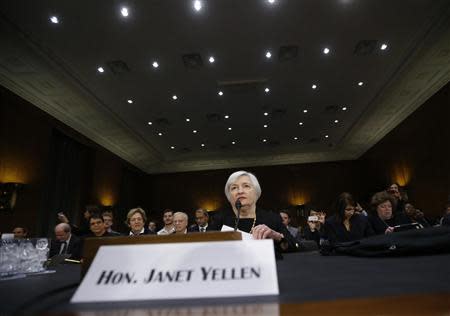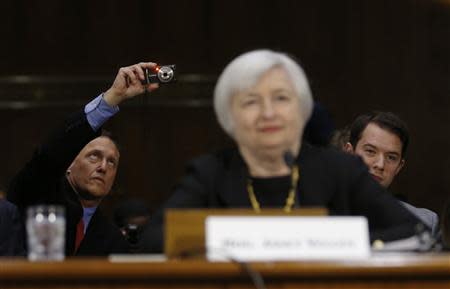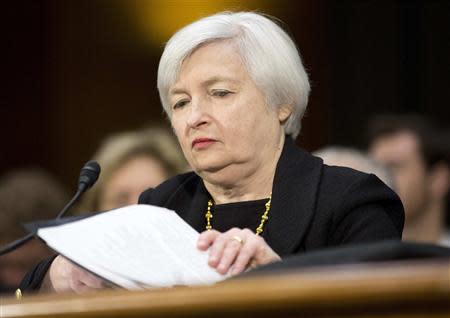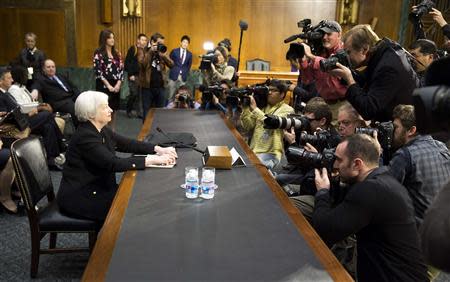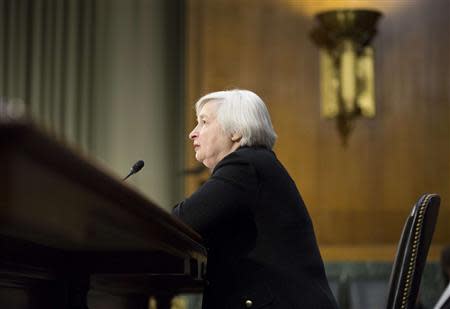By Alister Bull WASHINGTON (Reuters) - The most revealing thing about Janet Yellen's widely praised Senate confirmation hearing performance last week might not have been what she said, but what she didn't say - and how she didn't say it. President Barack Obama's nominee to be the next chair of the Federal Reserve smiled and nodded her way through a two-hour hearing on Thursday without giving the Senate Banking Committee any real clues as to how she views near-term monetary policy choices. She made plain that she thought it important to maintain aggressive efforts to spur U.S. economic growth and hiring. But her comments went no further than last month's statement from the Fed's policy-setting committee. Senators asked her how long the central bank could keep buying bonds, and seemed satisfied with her mild observation that purchases could not go on forever. She provided no clues to whether she leans toward reducing them next month, or next year. Economists had not expected her to intentionally front-run decisions yet to be made by the Fed's policy-setting committee. For one thing, current Fed chief Ben Bernanke doesn't step down until January 31. Yellen is expected to comfortably secure confirmation by the full Senate to replace him. But successfully parrying questions before Congress without accidentally hinting on future policy was seen as an important first success for the 67-year-old former professor. "She understood how to give an answer that was at least somewhat responsive to the question, without betraying any new information. It was an impressive performance," said Stephen Oliner, a former senior Fed economist. A second thing she didn't say anything about was her view on strengthening the Fed's forward guidance on when it might eventually raise interest rates. Here she owes a big assist to the senators. No one asked about it even though speculation is rife that the Fed will soon decide to keep rates near zero at least until the jobless rate drops to 6.0 percent. Its current threshold is 6.5 percent. Still, Yellen's performance on other issues left little doubt that if she had been asked, she would have offered an even-handed discussion on the economic literature around the issue, with scant information on where she stood. That was how she dealt with the query from Virginia Senator Mark Warner on lowering the interest the Fed pays on the excess reserves it holds for banks, which some officials think would be a way to give the economy a bit more stimulus. Yellen explained the pros and cons, reminded lawmakers that reducing IOER, as it is called, could be problematic for the money market mutual fund industry, and left them none the wiser. YELLEN FED Keeping calm under pressure is an important quality for a successful central banker. Fed watchers reckoned that it took Bernanke a year to really settle into the role, and recall the tell-tale quaver in his voice that betrayed the strain of being grilled by lawmakers. To be sure, Yellen got far kinder treatment than Bernanke often received. Perhaps that was because the Fed's Republican critics did not want to be seen baiting the first woman nominated to lead the central bank. Or perhaps they felt it would draw attention away from Obama's healthcare woes. But there was also interest in whether her reticence on shedding light on future policy might reflect a desire to avoid building expectations, which her colleagues at the Fed would subsequently have to either validate or ignore. In essence, will the Yellen Fed be more like the Bernanke Fed or the Fed under Alan Greenspan? Greenspan was much more likely to offer clues on where he wanted to lead policy. "Greenspan would give a little wink and nod and then the committee would have to go along after the fact," said Michael Feroli, an economist at JPMorgan in New York. "It is a probably good thing for the committee overall that she can sit in front of Congress and answer questions in a way that does not make the committee feel like their next move has to deliver on expectations set by what the chairman had already said." (Reporting by Alister Bull; Editing by Tim Ahmann and Chizu Nomiyama)
- My Portfolio
- News
- Markets
- Stocks: Most Actives
- Stocks: Gainers
- Stocks: Losers
- Trending Tickers
- Futures
- World Indices
- US Treasury Bonds Rates
- Currencies
- Crypto
- Top ETFs
- Top Mutual Funds
- Options: Highest Open Interest
- Options: Highest Implied Volatility
- Sectors
- Basic Materials
- Communication Services
- Consumer Cyclical
- Consumer Defensive
- Energy
- Financial Services
- Healthcare
- Industrials
- Real Estate
- Technology
- Utilities
- Research
- Personal Finance
- Videos
- Streaming Now
New on Yahoo
New on Yahoo
© 2024 All rights reserved.
Yahoo Finance
Yahoo Finance- My Portfolio
- News
- Markets
- Stocks: Most Actives
- Stocks: Gainers
- Stocks: Losers
- Trending Tickers
- Futures
- World Indices
- US Treasury Bonds Rates
- Currencies
- Crypto
- Top ETFs
- Top Mutual Funds
- Options: Highest Open Interest
- Options: Highest Implied Volatility
- Sectors
- Basic Materials
- Communication Services
- Consumer Cyclical
- Consumer Defensive
- Energy
- Financial Services
- Healthcare
- Industrials
- Real Estate
- Technology
- Utilities
- Research
- Personal Finance
- Videos
- Streaming Now

